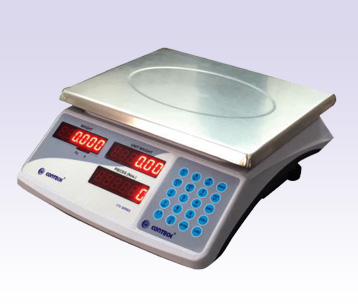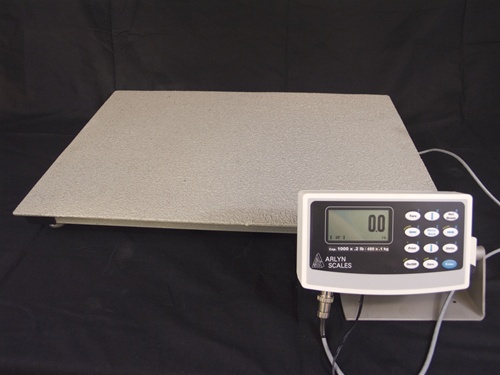Key Considerations When Choosing Industrial Scales for Your Warehouse Operations
Key Considerations When Choosing Industrial Scales for Your Warehouse Operations
Blog Article
Just How Industrial Scales Job: A Comprehensive Overview for New Users
Understanding the mechanics behind commercial scales is critical for new customers that desire to guarantee precision in their measurements. As we explore these parts, one need to consider exactly how these aspects connect to enhance efficiency in varied industrial applications.
Essentials of Industrial Scales
Industrial scales are essential tools used across numerous sectors, consisting of manufacturing, logistics, and farming, to make sure accurate weight measurements of hefty tons. The basic principle behind commercial scales includes the conversion of weight into a quantifiable form that can be shown electronically or analogically. These scales use various systems, such as lots cells or mechanical bars, to figure out the weight of items put upon them.

In enhancement to their measurement capacities, commercial ranges are developed to hold up against extreme atmospheres, featuring durable construction that withstands dust, moisture, and heavy effects. Calibration and upkeep are vital to ensure precision, as also small disparities can lead to substantial financial implications. By recognizing the basics of industrial ranges, customers can value their importance in various industrial applications.
Kinds Of Industrial Scales
Numerous kinds of industrial scales provide to the diverse requirements of different sectors, each designed to handle details considering jobs with accuracy and integrity. Among the most usual kinds are floor ranges, which are suitable for considering large and heavy products. These ranges generally include big systems and can suit palletized goods, making them crucial in stockrooms and delivery facilities.
One more kind is bench scales, which are frequently utilized for smaller products in manufacturing and retail setups. They supply accurate dimensions for items that require accuracy, such as chemicals or parts in setting up lines (Industrial Scales). For mobile procedures, portable scales supply adaptability and convenience of transport, suitable for fieldwork or temporary installments
In applications calling for high-capacity measurements, such as wholesale product handling, crane scales and load cells are utilized. These ranges can measure lots suspended from a crane or other training device, making certain safety and precision during procedures. In addition, specialized ranges like checkweighers are used in manufacturing lines to keep high quality control by guaranteeing that items satisfy weight requirements. Each sort of industrial range plays a critical duty in improving operational effectiveness and precision across different sectors.
How Considering Devices Work
Weighing mechanisms are crucial elements that make it possible for precise measurement of mass throughout different commercial ranges. These devices make use of different concepts of physics and design to offer accurate weight analyses, essential for inventory administration, quality control, and conformity with governing criteria.
One common kind of weighing device is the lots cell, which operates the principle of pressure gauges. When a load is applied, the load cell deforms a little, producing an electric signal symmetrical to the weight. This signal is then transformed into a readable weight dimension by the scale's electronics.
An additional commonly used system is the mechanical balance, which utilizes a system of levers and weights. Industrial Scales. This method counts on the principle of balance, where the weight of the things being gauged is stabilized versus recognized weights, permitting straight measurement
Furthermore, pneumatically-driven and hydraulic scales utilize liquid dynamics concepts to gauge weight. These systems use the stress applied by a load to figure out weight, supplying high precision for massive tons.
Correct Use Methods
When utilizing commercial ranges, sticking to proper usage methods is vital for making certain exact dimensions and keeping equipment integrity. It is necessary to select the proper range for your certain application, as ranges differ in capability and precision.
Prior to evaluating, make certain that the scale is put on a secure, level surface area totally free from vibrations or disturbances. This will certainly help to reduce mistakes triggered by external variables. In addition, adjust the range according to the producer's specifications before make use of, making sure that it is operating properly.
When positioning items on helpful hints the scale, distribute the weight uniformly to stay clear of tipping or damaging the tools. Constantly enable the scale to stabilize prior to recording the weight, as changes might occur during initial placement. For bulk products, use containers that are appropriate for the range size to avoid overloading.
Furthermore, stay clear of putting cool or excessively hot things directly on the range, as temperature level variations can influence precision. Lastly, maintain the weighing platform cost-free and clean of debris to stop contamination and make sure reputable results. By following these strategies, users can optimize the efficiency and durability of their commercial ranges.
Maintenance and Calibration Tips
Making certain the longevity and precision of commercial scales calls for diligent upkeep and normal calibration. A precautionary upkeep schedule is crucial; it should include routine examinations to determine damage, particularly on tons cells and various other sensitive elements. Consistently cleaning up the scale's surface and making sure the bordering location is without debris will assist preserve its honesty and efficiency.
Calibration is equally important and ought to be carried out at regular intervals or whenever the scale experiences significant modifications in temperature level, moisture, or physical displacement. Make use of qualified calibration weights that are traceable to national standards for accuracy. File each calibration session thoroughly to track efficiency with time and recognize any trends or try this website recurring issues.
Additionally, be mindful of the scale's atmosphere. Stay clear of positioning it near resources of resonance, electro-magnetic disturbance, or severe temperature levels, as these aspects can detrimentally influence dimensions. Train all drivers on appropriate scale usage and upkeep procedures to guarantee consistent performance and precision. By sticking to these maintenance and calibration suggestions, users can enhance the integrity of their commercial scales, guaranteeing ideal procedure in any type of setting.
Verdict

Understanding the auto mechanics behind industrial scales is important for brand-new customers who want to ensure accuracy in their measurements.Industrial ranges are essential devices made use of throughout numerous markets, including manufacturing, logistics, and agriculture, to make certain exact weight dimensions of heavy loads. The fundamental concept behind commercial ranges includes the conversion of weight into a quantifiable kind that can be shown digitally or analogically. By recognizing the basics of industrial scales, users can value their value in different industrial applications.
In verdict, more information comprehending the operation and upkeep of commercial scales is crucial for ensuring exact weight measurements in numerous applications. (Industrial Scales)
Report this page